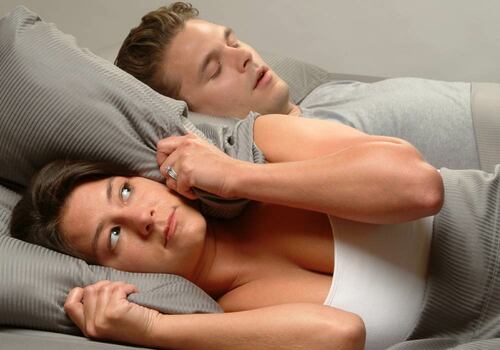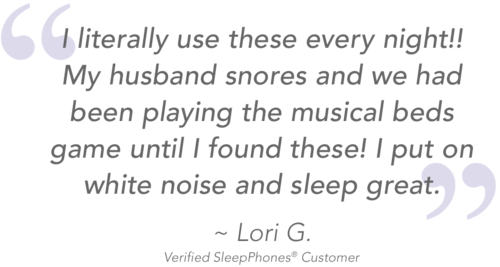Is Your Partner’s Snoring Keeping You Up At Night? Here’s What You Need to Know.
Are you at your wit’s end because your significant other’s snoring keeps you awake? If your partner’s nighttime log-sawing is causing you to lose sleep, you’re probably looking for a better approach than leaving your warm bed to crash on the couch.

The good news? You’re not alone! Snoring is a common problem. According to the National Sleep Foundation, it affects 90 million American adults—and 37 million of those individuals snore regularly.
The not-so-good news? Snoring can range from mild to severe, and severe cases can put sufferers at risk for some serious health concerns. What’s more, it’s a condition that generally becomes worse with age.
A study by the Mayo Clinic found that the sleep of a significant other was interrupted an astounding average of 21 times an hour from snoring. If you’re negatively affected by your partner’s nocturnal noises, here is what you need to know.
What is Snoring?
Simply put: snoring is loud breathing during sleep. It occurs when air flows past relaxed tissues in the back of your throat and causes the muscles to vibrate while you breathe.
While you sleep, your throat muscles relax, your tongue falls backward, and your throat narrows. The more narrow your airway becomes, the more the walls of your throat vibrate and the louder your breathing becomes, resulting in snoring.
According to the Mayo Clinic, the most common signs of sleep apnea include:
- Difficulty maintaining daytime focus
- Insomnia
- Irritability
- Loud snoring
- Morning headache
- The repeated cessation of breathing
- Waking up with a dry mouth
Sometimes snoring isn’t just annoying: it can be life-threatening. If one’s breathing passage becomes completely blocked, it creates apnea (the cessation of breathing). People experiencing apnea may gasp for air. The Mayo Clinic says this pattern can repeat between 5 to 30 times per hour during the night, which keeps a person with apnea from reaching the deepest phase of sleep.
According to the National Sleep Foundation, about half of people who snore loudly have obstructive sleep apnea. Left untreated, it can lead to congestive heart failure, depression, heart attack, high blood pressure, and stroke, as well as disturbed sleep and daytime sleepiness.
If you believe you or your loved one may have sleep apnea, consult your doctor immediately to ensure you have the best, most accurate medical guidance for dealing with this issue.
Who is at Risk of Snoring?
Being male and overweight seem to be the most significant factors that cause a person to snore. According to the American Academy of Sleep Medicine, men are roughly 67% more likely to snore than their female counterparts.
While there are a variety of factors that contribute to a person’s risk of snoring, two seem to have the most significant impact:
- Being male
- Being overweight
However, having a structural defect, such as a deviated septum, can also lead to snoring. Some people naturally have a long soft palate or large tonsils and adenoids. These anatomical differences can create a narrower airway, making them more prone to loud nighttime breathing.
Temporary issues can also lead to snoring. Congestion from a cold or allergies can block one’s airway and result in noisier nighttime breathing. Ironically, being sleep deprived itself can cause one’s throat to relax more than usual and lead to snoring.
Besides being male or overweight, certain conditions and habits make it more likely a person will snore. These factors include, but are not limited to:
- Alcohol
- Allergies
- Back sleeping
- Colds
- Deviated septum
- Muscle relaxers
Small Changes Can Curb Snoring
While the risks of persistent snoring can be dangerous, small changes can have a significant impact.

First, ask your significant other to avoid consuming alcohol right before bed. Imbibing right before he or she crawls under the covers can cause your partner’s throat muscles to slacken and make snoring worse.
Second, if your partner sleeps on his or her back, he or she may snore louder. Why? Basically, it’s gravity. When a person lies on his or her back, it causes the tongue and soft palate to collapse slightly, further narrowing the airway.
It’s for that reason that side sleeping can be a quick and easy fix to occasional snoring. Your significant other can try using a pillow specially designed to encourage side sleeping. The United Kingdom’s National Health Service even suggests taping a tennis ball to the back of a snorer’s pajamas to discourage back sleeping.
Also, treating nasal congestion can mitigate loud nighttime breathing. If your partner’s cold worsens his or her snoring, a decongestant may help for a day or two. People suffering from allergies can talk to their doctor about medication or steroid nasal sprays to combat seasonal mucus.

However, it’s important to get the professionals involved. Dentists can fit people who snore with a plastic oral appliance to help keep their breathing passages open as they sleep. Snorers with obstructive sleep apnea will need to obtain a continuous positive airway pressure (CPAP) device from their doctor.
Surgical intervention is another option for loud nighttime noises, albeit a more invasive one. The pillar procedure is a minor surgery in which a surgeon implants small polyester rods into a patient’s soft upper palate. As the tissue heals around the implants, the roof of the mouth becomes more rigid and less apt to vibrate and cause snoring.
According to the Mayo Clinic, a doctor will first recommend lifestyle changes for chronic snorers. The changes they may prescribe include:If obstructive sleep apnea accompanies your significant other’s snoring, a doctor may also suggest:
- Avoiding alcohol before bed
- Avoiding sleep deprivation
- Avoiding back sleeping
- Losing weight
- Treating nasal congestion
- Continuous positive airway pressure (CPAP)
- Oral appliances
- Upper airway surgery
How to Mask Snoring Sounds
Of course, all of these tips hinge on your partner adopting lifestyle changes—some more drastic than others—to stop snoring. If that’s not possible, you still have options. Commonly, some people use white noise machines or earplugs to block loud sounds.
Wearing earbuds or headphones in bed to drown out snoring is another option. Of course, this may not be practical since most headphones are bulky and earbuds are too uncomfortable to wear all night. For that exact reason, so many people losing sleep to a snoring spouse love SleepPhones®, the world's most comfortable headphones for sleeping.
While you’re waiting for your significant other to see a doctor or make lifestyle changes to combat snoring, you may need to take matters into your own hands so you can get a good night’s rest. Mask this unwanted noise by:
- Putting in earplugs
- Running a fan near the bed
- Using a white noise machine
- Wearing headphones to bed
SleepPhones® Are Reuniting Couples

You probably don’t need a study to tell you this, but here’s one anyway: couples who sleep closer together are more satisfied with their relationship. University of Hertfordshire psychology professor Richard Wiseman asked 1,000 people about their sleeping positions and relationship quality at the Edinburgh Science Fair. His study showed that 94 percent of couples who spent the night in close contact were happy with their connection as opposed to 68 percent of those who didn’t touch their significant other during the night. The farther apart the pair were as they slept, the less satisfied they were with the relationship.

"The only reason my husband and I are still married! Best investment ever!" - Rebecca N.
"Might I suggest @SleepPhones? On a friend’s recommendation I got my husband some for Christmas and he wears them almost every night now! No more lost AirPods! (And no more headaches for him. For some reason the devices in his ear were starting to give him an all day earache and headache)." - Marisol L.

"I literally use these every night! My husband snores and we had been playing the musical beds game until I found these! I put on white noise and sleep great." - Lori G.
"My husband snores SO bad! I use wax ear plugs but sometimes they aren't enough! My pair of SleepPhones® are a dream come true! I recommend these to anyone who loves sleep! A very happy customer." - Ashley D.

"I use these every night. My husband snores like ten bears. Saved my sleep life. I've used these for going on six years now. I listen to white noise and a few other things on top of that. Best thing yet." - Tiffani W.
"I rely on SleepPhones® to help me sleep since I suffer from insomnia. I play one of two CDs with ocean sounds mixed with white or pink noise. It really helps me sleep and helps block the snoring sounds from my wife." - Robert U.
Before you resign yourself to another night on the couch, give SleepPhones® a try. With a luxuriously soft headband and flat speakers, there are clear reasons why more than 9 out of 10 customers would recommend SleepPhones® to a friend.
Find more at our resource page dedicated to Snoring.
